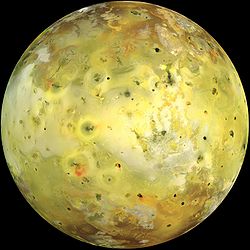Io
| Io | |
 | |
| Planetary characteristics | |
|---|---|
| Orbit | 421,700 km from Jupiter (mean) |
| Diameter | 3,630.6 km (equatorial) |
| Surface Gravity | 0.18 G |
| Year | 42.5 hours |
| Day | 42.5 hours |
| Mean Temperature | 110°K (-163.15°C) mean |
| Atmosphere | trace (90% SO2) |
| Water/Ice Index | 0% |
| Population (2013) | transient only, no permanent residents |
| Political Affiliation | Fenspace Convention |
| Capital | administered from Serenity Valley, Ganymede |
Io is the inner most of the Galilean moons of Jupiter. A relatively large[1] satellite, it is the most volcanically active body in the solar system. Tidal stresses introduced during Io's orbit of Jupiter heat the interior of the moon to great levels. Plumes of molten sulfur compounds and silicates can be launched 200km from the moon's surface during some volcanic events, and lakes of molten sulfur compounds can be found across the surface.
The moon's surface is mostly yellow and white because of the sulfur, except near the poles where radiation damage turns the sulfur red.
Io is largely uninhabited, and is considered massively unsuited to colonization for several reasons, the main two being the strength of the Jovian magnetic field around Io[2] and the moon's volcanism. The Whedonites and Heinleinians occasionally send short term prospecting and mining operations to Io - there's a lot of sulfur and magnesium to be harvested - and the occasional Mad will try some new scheme to tap the moon's magnetic field for electrical power, but it is far too dangerous to attempt a permanent settlement.
Related Links
Notes
- ↑ About 5% larger in diameter and 20% more massive than Luna.
- ↑ There is a belt of radiation centered on Io, and the moon receives approximately 3,600 rem a day.